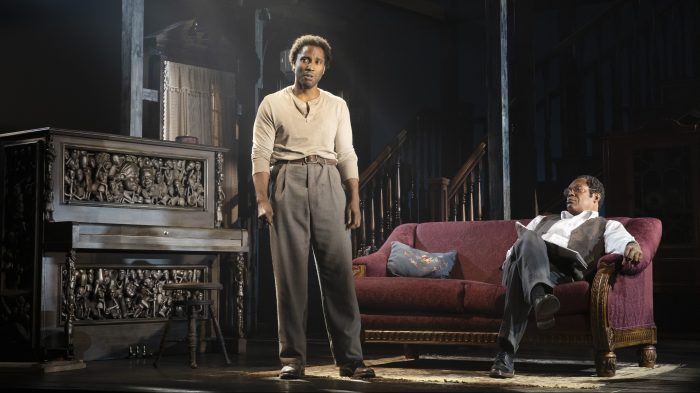Men these days are Not OK.
American men, like their counterparts around the globe, are in crisis. They are succumbing to deaths of despair, struggling with alienation and are responsible for most crimes of violence. The first half of the 2022-23 theater season brought revivals of three classic plays — Death of a Salesman, Topdog/Underdog, and The Piano Lesson — that provided new ways to see the intransigence of these problems.
At the center of each play are men who are Not OK. They are lonely, they’re broke, they’re frustrated, and they’re caught in an unwinnable rat race of racial capitalism that has sent their sense of self-worth tumbling. Whether their stories take place in post-World War II boom times, or modern America, or the Great Depression, the men dowse their pain in drink, pick fights, make fantastical plans, and seek comfort in ways that harm the people they love.
The festering of disillusionment, suspicion, and fermented hope experienced by Willy Loman, the brothers Lincoln and Booth, and Boy Willie remain as recognizable as ever. It’s the same festering that leads men to seek certainty in nostalgia and autocracy, in the manosphere, in hucksters, insurrectionists, and reactionary prophets of male grievance such as Joe Budden, the Liver King, Andrew Tate, Joe Rogan, Alex Jones, and Kevin Samuels.
In ‘Ma Rainey’s Black Bottom’ the New Negro and the Old collideRead now
It matters little whether a man is playing three-card monte, betting on meme stocks, or buying the crypto dip as an escape hatch from structural inequalities. Injuries to dignity leave the same scars. These plays are a warning, a siren for a problem that is endemic and spiraling rapidly.
“The economic difficulties of working-class men ends up hurting families and putting more pressure on women,” Brookings Institution fellow Richard V. Reeves writes in Of Boys and Men: Why the Modern Male is Struggling, Why It Matters, and What to Do About It, which was published in the fall. “ … childhood disadvantage hurts boys more than girls, resulting in a corrosive, intergenerational cycle. As working-class men struggle, their families become poorer; and in these families, boys suffer most, which damages their prospects in adult life. The male malaise becomes an inherited condition.”
Reeves is careful not to engage in the sort of zero-sum blame game that tends to unite various corners of the manosphere. “The success of the women’s movement has not caused the precariousness of male social identity, but it has exposed it,” Reeves asserts. “The question is where we go from here.”
If anything, these three productions show the answer won’t be easy.
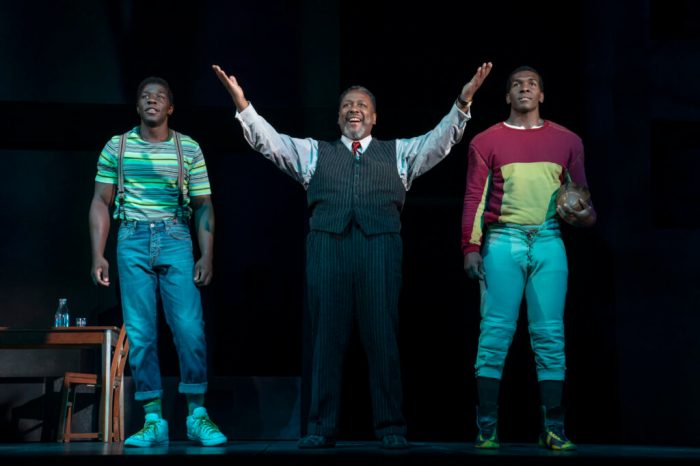 From left to right: McKinley Belcher III, Wendell Pierce, and Khris Davis as Happy, Willy, and Biff Loman in Death of a Salesman..
From left to right: McKinley Belcher III, Wendell Pierce, and Khris Davis as Happy, Willy, and Biff Loman in Death of a Salesman..
Joan Marcus
Let’s start with Death of a Salesman, Arthur Miller’s 1949 play about Willy Loman, a man struggling to fulfill the expectations and duties of a husband and his family’s sole breadwinner. The company to which he has dedicated himself doesn’t have a budget line for Willy’s dignity. Rather than offering this longtime traveling salesman a salaried job in the home office until retirement, Willy’s boss sends him tumbling into financial precarity. Meanwhile, bills for a refrigerator and a washing machine, a carburetor, and a new roof for the house continue to mount. Reeves, in his book, invokes Loman as an archetypal example of how “Men’s freedom has often been stifled by patriarchy… with tightly prescribed roles and oppressive expectations.”
Willy’s wife, Linda, is a dutiful, supportive household accountant, but she’s turned a blind eye to the signs that her husband is unraveling, even as their grown sons, Biff and Happy, recognize their father’s discontent. Willy has been playing fake-it-till-you-make-it with his family, and by the end of the play, confronted by his deceptions and delusions, Willy kills himself, crashing the very vehicle that was so central to his identity as a provider.
Death of a Salesman, which concluded its run at the Hudson Theatre Jan. 15, has been revived many times. But this production, directed by Miranda Cromwell, may be the first time the Loman family was played entirely by Black actors. The cast was packed with talent, with Wendell Pierce playing Willy, Sharon D. Clarke as Linda, McKinley Belcher III as Happy and Khris Davis as Biff. André De Shields was Willy’s late brother Ben, whose financial success haunts the struggling Willy.
As embodied by Pierce, Willy’s naivete ends up highlighting how Black faith in white American institutions can appear silly, inevitably tragic, a transparent waste of time. The nuclear wholesomeness and success that he’s chasing fits like a bad suit. Led by a patriarch who bought into a game that was never intended for his full participation, the Lomans are left tossing dirt into a grave and cashing an insurance check.
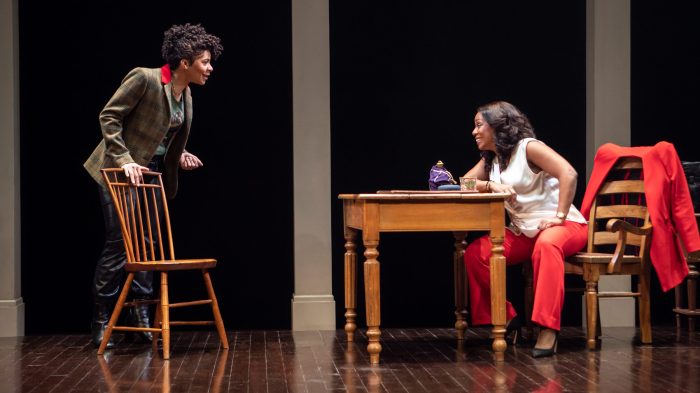 ‘Confederates’ follows Black women in a dangerous gameRead now
‘Confederates’ follows Black women in a dangerous gameRead now
I wonder what August Wilson, author of The Piano Lesson, would have made of this production of Death of a Salesman. He decried colorblind casting when speaking in 1996 at Princeton University. According to Errol G. Hill and James V. Hatch’s A History of African American Theatre, Wilson characterized the practice as “an aberrant idea … a tool of cultural imperialists. To mount an all-black production of a … play conceived for white actors … is to deny us our humanity, our own history, and the need to make our own investigations from the cultural ground on which we stand as black Americans … We need those misguided financial resources to be put to better use.”
When Black people play the Lomans, it requires the actors to strip themselves of the taciturn practicality and learned skepticism that was so often necessary for them to survive a hostile 1949 America. Instead, the actors commit themselves to a kabuki of white stability, which means straining credulity. The Lomans live in Brooklyn. But, figuratively, the life Willy is chasing is the storybook life of a suburban Levittown, which was defined by its government-sanctioned segregation.
In Pierce’s hands, Willy becomes more pathetic, more tragic, more lost, more hoodwinked, as he desperately tries to shoehorn his family into a live-action Norman Rockwell painting. His fatal end seems all the more inevitable because he is chasing a life we know cannot belong to him. How can it, when his country has purposefully excluded him from it?
 Topdog/Underdog is the story of two hustling brothers, the elder topdog, Lincoln, portrayed by Corey Hawkins (right) and his underdog sibling, Booth, played by Yahya Abdul-Mateen II (left).
Topdog/Underdog is the story of two hustling brothers, the elder topdog, Lincoln, portrayed by Corey Hawkins (right) and his underdog sibling, Booth, played by Yahya Abdul-Mateen II (left).
Marc J. Franklin
If Death of a Salesman offers a portrait of the tragedy of buying into the rules of a game you were never meant to win, Suzan-Lori Parks’ Topdog/Underdog is a peek at the pleasures and pains of divestiture. And what a pleasure it was to take in. The revival of Parks’ masterwork, starring Corey Hawkins and Yahya Abdul-Mateen II in the title roles, ended its run at the Golden Theatre on Jan. 15, but I haven’t been able to stop thinking about it since. This production, helmed by Kenny Leon, soared with lively physical performances from both actors. Parks’ clear, bold constructions of their conditions and psyches successfully steer audiences away from the inevitability she telegraphs with the names of her characters.
Topdog/Underdog is the story of two hustling brothers, the elder topdog, Lincoln (Hawkins) and his underdog sibling, Booth (Abdul-Mateen II). They’ve squeezed into a shabby single room occupancy with a twin bed, a recliner, and not much else. It used to be a bachelor pad for Booth alone, until Lincoln sought shelter with his brother after his marriage disintegrated.
Lincoln, once a whiz at separating people from their cash with games of three-card monte, has gone straight, availing himself of the security of a job that comes with a W-2. He works at an arcade, where he plays the 16th president. Every day, Lincoln dons a stovepipe hat, paints his face white, and becomes Honest Abe in the audience of Our American Cousin, the play his namesake was attending when John Wilkes Booth pulled out a derringer and fatally shot him. The job consists of reenacting Abraham Lincoln’s assassination, with customers paying for the privilege of pulling the trigger.
Left prematurely by their parents to fend for themselves, Lincoln and Booth are attempting to terraform possibilities within an economic system that runs on the exploitation and devaluation of their labor and lives, a fact punctuated by the detail that Lincoln gets paid less than the white actor who previously held his job. Meanwhile, what Booth cannot buy or lease, he simply boosts, and combined with the income from Lincoln’s day job, there’s enough cash left over for booze and a date night or two. (Lincoln and Booth’s names come from their father, who was tickled by the irony.) Lincoln wishes to get better at playing Lincoln, entreating Booth to run lines with him and offer notes. Booth, meanwhile, wishes to occupy the status Lincoln enjoyed when he was the king of throwing cards, even though Lincoln repeatedly tries to direct Booth’s attention elsewhere. The younger brother lacks Lincoln’s fast hands and faster eyes, and grows to resent what he sees as his brother’s refusal to help him get ahead.
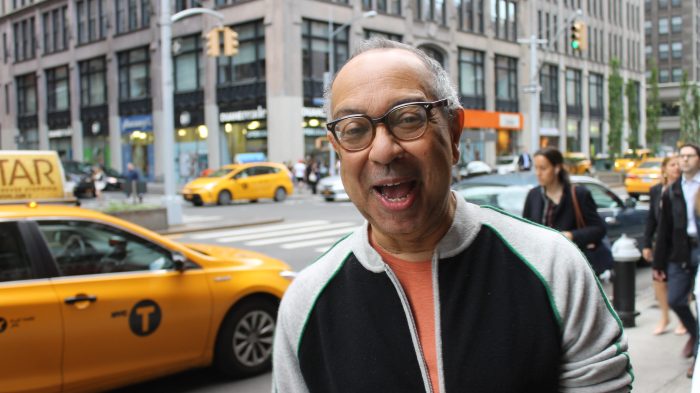 George C. Wolfe’s appropriation bluesRead now
George C. Wolfe’s appropriation bluesRead now
Neither is quite the Pollyanna that Willy Loman is. Lincoln is trying to fashion some stability from his macabre occupation, while Booth dreams of marrying his girlfriend and starting a new life. Both men have typical aspirations, even if Booth’s methods for attaining them involve mainly larcenous shortcuts and magical thinking. Their matchbox apartment, however, leaves little room for their frustrations to dissipate. Instead, the dingy studio becomes a pressure cooker. The atmosphere between the brothers grows acrid and thickens with resentment. The release comes in a violent flash of anger, followed immediately by solitude and regret.
What makes Topdog/Underdog so resonant, but also so worrisome? Perhaps it is because the economic forces ratcheting up the tension between two brothers are real, and come in cycles that we have not been able to stop. And that lack of meaningful intervention has dire consequences for communities that echo across generations.
“Economic and social disadvantage hurts boys more than girls,” writes Reeves. “This is an extremely important fact, and one that has yet to receive nearly enough attention. The problems of men are not only fueling social and economic inequality but also being caused by it.”
Outside the theater, the shell game of Topdog/Underdog has merely become technologized, adapted to the computers we carry in our pockets. Crypto, meme stocks — those are the three-card monte of our era, complete with big winners and often bigger losers.
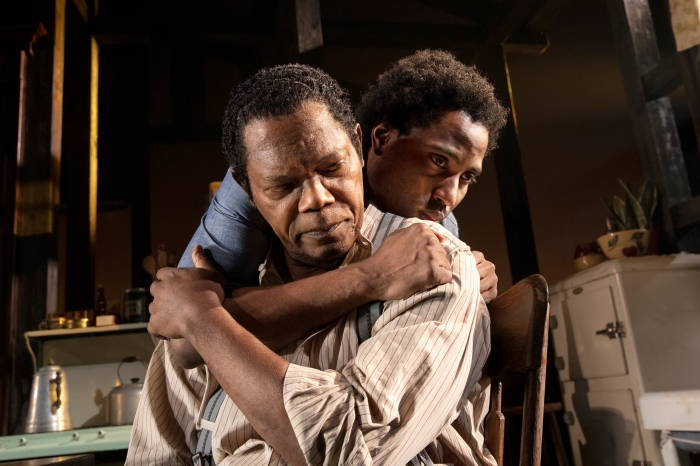 The Piano Lesson unfolds as a feud between two siblings of the Charles family. John David Washington (right) plays Boy Willie Charles, and Samuel L. Jackson (left) portrays his uncle, Doaker.
The Piano Lesson unfolds as a feud between two siblings of the Charles family. John David Washington (right) plays Boy Willie Charles, and Samuel L. Jackson (left) portrays his uncle, Doaker.
Julieta Cervantes
While Death of a Salesman and Topdog/Underdog culminate in death, Wilson’s The Piano Lesson (1987) conjures a reprieve for its fast-talking dreamer, Boy Willie Charles, played by John David Washington at the Ethel Barrymore Theatre in a run that concluded Jan. 29. Set in the Pittsburgh of 1936, as the country is still attempting to rouse itself from the thick sludge of the Great Depression, The Piano Lesson unfolds as a feud between two siblings of the Charles family.
The Charleses possess a unique family heirloom: a piano that features the faces of their ancestors carved into the body of the instrument. An artifact of the family’s tribulations through enslavement and Jim Crow, the piano is enchanted with ghosts and memory, as it used to belong to the Sutters, the white family who once owned earlier generations of Charleses. As slaveholders, Master Sutter traded two Charles family members for the piano—an anniversary present for his wife—because he lacked the cash to buy it. When Mistress Sutter misses the two enslaved people her husband traded away, Master Sutter makes a request of the remaining slave, whose family he just splintered: carve the faces of the now-traded-away wife and child into the piano. Instead of simply carving two faces, the enslaved Charles ancestor etches as much of the family’s lineage as he can remember into the instrument. Generations later, aided by his brother Doaker, Boy Willie’s father steals the piano from the Sutters. A lynch mob catches Boy Willie’s father as he’s attempting to leave town by train, burning the boxcar in which he absconded. The piano, however, stays with Doaker.
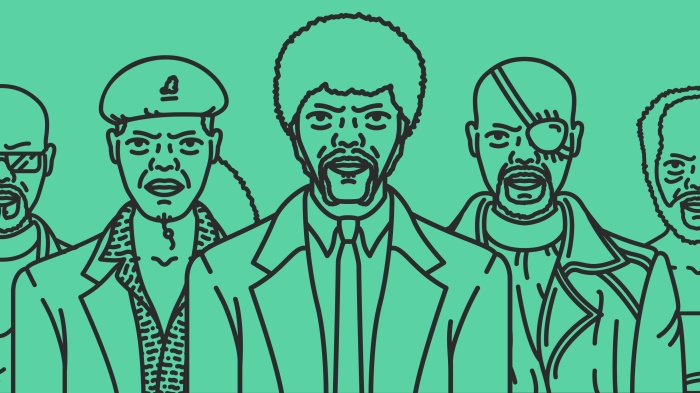 Samuel L. Jackson ranks Samuel L. JacksonRead now
Samuel L. Jackson ranks Samuel L. JacksonRead now
Accompanied by his dim-witted, if well-intentioned friend Lymon (Ray Fisher), Boy Willie drives a raggedy truck full of watermelons to the house where his sister, niece, and uncle live. It’s been three years since he’s seen his sister, because Boy Willie has been incarcerated at Parchman prison.
Now, he wants to sell the piano his father died stealing.
The piano sits in the living room of his uncle Doaker’s house, its own weight and the will of ghosts making it nearly immovable. But Boy Willie, eager to outrun a painful past and start anew, hopes to convert family history into cash and self-determination. The profit he splits from the sale will be enough for a down payment on a patch of land where he can start his own farm.
Washington held his own in a company packed with talent. The buoyancy that Washington brought to the arrogant, garrulous wide receiver Ricky Jerret in Ballers serves him well in The Piano Lesson, his Broadway debut. Samuel L. Jackson, who originated the role of Boy Willie in 1987 at Yale Repertory Theatre, played Doaker this time, leading the production with the cool, confident looseness of a jazz soloist admiring his fellow musicians during a jam session. And most of the play proceeds with this energy as a coterie of characters, each hilariously memorable, traipses through the Charles house.
But as Boy Willie continually fails to get what he wants, his anger and resentment grow. He tries to impose his will by force, and turns menacing and acid-tongued during a fight with his sister Berniece that only Doaker can quell. As Berniece, Danielle Brooks grounds the production with impassioned, righteous obstinacy, her soaring singing voice rousing the packed house to its feet once she unleashes it in the final act, hoping to exorcize a lingering Sutter ghost once and for all.
For much of the play, the piano sits in Doaker’s parlor, a silent memorial that a mournful Berniece cannot bring herself to play. She’s not making use of the piano because doing so stirs up too much emotional pain, but she’s determined to hang on to it anyway. But at the play’s conclusion, Berniece confronts her grief. Director LaTanya Richardson Jackson has the eaves of Doaker’s house, which had been splintered, unjoined puzzle pieces for almost the entirety of the play, come together. Finally, there is peace in the Charles house.
It’s a hopeful ending, an argument for art and spirituality as forces strong enough to cauterize familial wounds rooted in a bitter feud over exploitation, memory, and inheritance. And what is art if not fermented hope? (I find fermentation interesting because it’s a process that can go magically right or horribly wrong. The results can be tasty, unctuous, contain myriad depths. They can be revelatory and revolutionary like funk, like the blues, like jazz, like hip-hop — or you can wind up with an inedible mold plantation.)
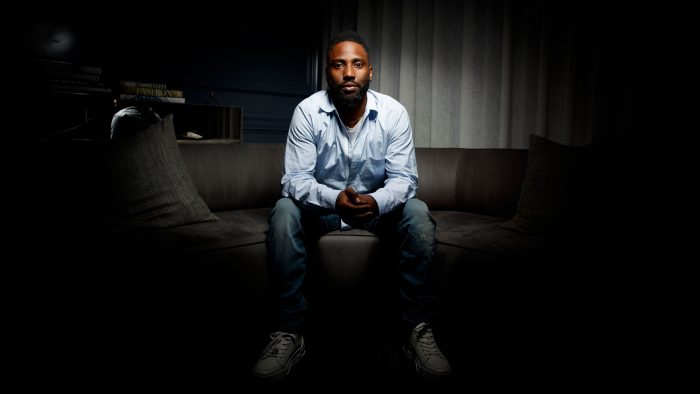 John David Washington outran his father’s long shadow with a football in handRead now
John David Washington outran his father’s long shadow with a football in handRead now
Still, as Boy Willie exits, he issues his sister a warning: “Hey Berniece … if you and Maretha don’t keep playing on that piano … ain’t no telling … me and Sutter both liable to be back.” A house that stood divided has reconnected, but there’s no guarantee that it will remain so. The fault lines are always there.
Wilson considered The Piano Lesson, which comes fifth in the chronology of his Pittsburgh or Century Cycle, his best play, according to Hill and Hatch. He wrote Black men with a ferocious intimacy, connecting their pasts to their present. He excelled at animating the universalities among the lives of Black Southerners seeking to put distance between themselves and generations of heartbreak, misery, and dispossession.
In Of Boys and Men, Reeves explains how massive changes in work, family, and religion — institutions that American men, regardless of race, have used to define themselves and their roles in society — have left men reeling as they struggle to adjust to new and fast-changing norms. Referencing the words of anthropologist Jennifer Silva, Reeves writes of men who are attempting to “‘sustain the masculine legacy of provision, protection, and courage that they inherited.’” “Others seek alternative routes to masculine identity, including commitments to religion or individually focused self-improvement,” Reeves writes. “Some have succumbed to white nationalism, others to the temporary escapism of opioids. In one way or another, all are trying, in Silva’s words, ‘to piece the self back together.’ ”
In Richardson Jackson’s Piano Lesson, the Doaker house becomes a visual metaphor, not just for the Charles family, but for Boy Willie, too, as a man trying to reassemble himself post-incarceration.
Death of a Salesman, Topdog/Underdog, and The Piano Lesson remain timely because the forces shaping the men at their centers remain stubbornly, ruthlessly cyclical. But they are also very much cultural objects of the 20th century. In the earlier days of the coronavirus pandemic, attempting to think about what sort of new art might emerge from an extended period of forced isolation, uncertainty, worry, illness and death, I predicted that we would see stories revolving around themes of loneliness and introspection, stories that poked at the downstream effects of a spiritual and social asceticism imposed by a pathogen that could kill you.
When it came to Broadway, I was half right — I had neglected to think about existing works that already dwell in those thematic spaces. Now, as we learn to live with the virus, young playwrights are taking on the challenges of extrapolation. In Dave Harris’ Tambo & Bones, oppressed and oppressor eventually end up switching roles, and the American brutishness that was the midwife to their existences simply continues into the perpetuity of artificial intelligence and beyond. In Ain’t No Mo’, an attempt to abandon the familiar and step into an ambiguous, yet-to-be defined tomorrow, leaves one drag queen flight attendant naked, trembling, forsaken, and alone.
Guided by Death of a Salesman, Topdog/Underdog, and The Piano Lesson, a question looms: Will it be any different for the Willy Lomans, Lincolns, Booths, and Boy Willies of today, thrown about by forces, and policies that have left them Not OK?
Soraya Nadia McDonald is the senior culture critic for Andscape. She writes about pop culture, fashion, the arts and literature. She is the 2020 winner of the George Jean Nathan prize for dramatic criticism, a 2020 finalist for the Pulitzer Prize in criticism and the runner-up for the 2019 Vernon Jarrett Medal for outstanding reporting on Black life.
